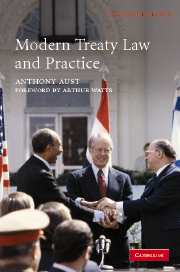Book contents
- Frontmatter
- Contents
- Foreword to the first edition by Sir Arthur Watts
- Preface to the second edition
- Articles of the Convention cited in the text
- Table of treaties
- Table of MOUs
- Table of cases
- Glossary of legal terms
- List of abbreviations
- Introduction
- 1 Vienna Convention on the Law of Treaties 1969
- 2 What is a treaty?
- 3 MOUs
- 4 Capacity to conclude treaties
- 5 Full powers
- 6 Adoption and authentication
- 7 Consent to be bound
- 8 Reservations
- 9 Entry into force
- 10 Treaties and domestic law
- 11 Territorial application
- 12 Successive treaties
- 13 Interpretation
- 14 Third states
- 15 Amendment
- 16 Duration and termination
- 17 Invalidity
- 18 The depositary
- 19 Registration and publication
- 20 Dispute settlement and remedies
- 21 Succession to treaties
- 22 International Organisations
- 23 Drafting and final clauses
- Appendices
- Index
8 - Reservations
- Frontmatter
- Contents
- Foreword to the first edition by Sir Arthur Watts
- Preface to the second edition
- Articles of the Convention cited in the text
- Table of treaties
- Table of MOUs
- Table of cases
- Glossary of legal terms
- List of abbreviations
- Introduction
- 1 Vienna Convention on the Law of Treaties 1969
- 2 What is a treaty?
- 3 MOUs
- 4 Capacity to conclude treaties
- 5 Full powers
- 6 Adoption and authentication
- 7 Consent to be bound
- 8 Reservations
- 9 Entry into force
- 10 Treaties and domestic law
- 11 Territorial application
- 12 Successive treaties
- 13 Interpretation
- 14 Third states
- 15 Amendment
- 16 Duration and termination
- 17 Invalidity
- 18 The depositary
- 19 Registration and publication
- 20 Dispute settlement and remedies
- 21 Succession to treaties
- 22 International Organisations
- 23 Drafting and final clauses
- Appendices
- Index
Summary
The subject of reservations to multilateral treaties is one of unusual – in fact baffling – complexity.
a matter of considerable obscurity in the realm of juristic speculation.
These depressing views by the eminent international lawyers, Hersch Lauterpacht and O'Connell in 1953 and 1970, respectively, are even truer today. The last word had not been said in Articles 19–23. As is apparent from the vast amount which has been written on the subject, a spirited debate has developed on how those articles should be applied, especially the effect of an objection to a reservation on the ground that it is contrary to the object and purpose of the treaty: an issue seen as particularly relevant to human rights treaties.
It would be wrong to think that the problems are just theoretical. Since the Second World War, and especially during the last quarter of the twentieth century, there has been an enormous increase in the number and complexity of multilateral treaties on all subjects, and in the number of states adhering to them. In 1945, the United Nations had fifty-one Members; by the end of 2006, it had 192. In the twenty years from 1975 to 1995 just one state, the United Kingdom, became a party to some 330 multilateral treaties, and made reservations to forty-five of them. Every week foreign ministries will be notified of new reservations. They will have to consider whether they are acceptable and, if not, what to do about them.
- Type
- Chapter
- Information
- Modern Treaty Law and Practice , pp. 125 - 161Publisher: Cambridge University PressPrint publication year: 2007

